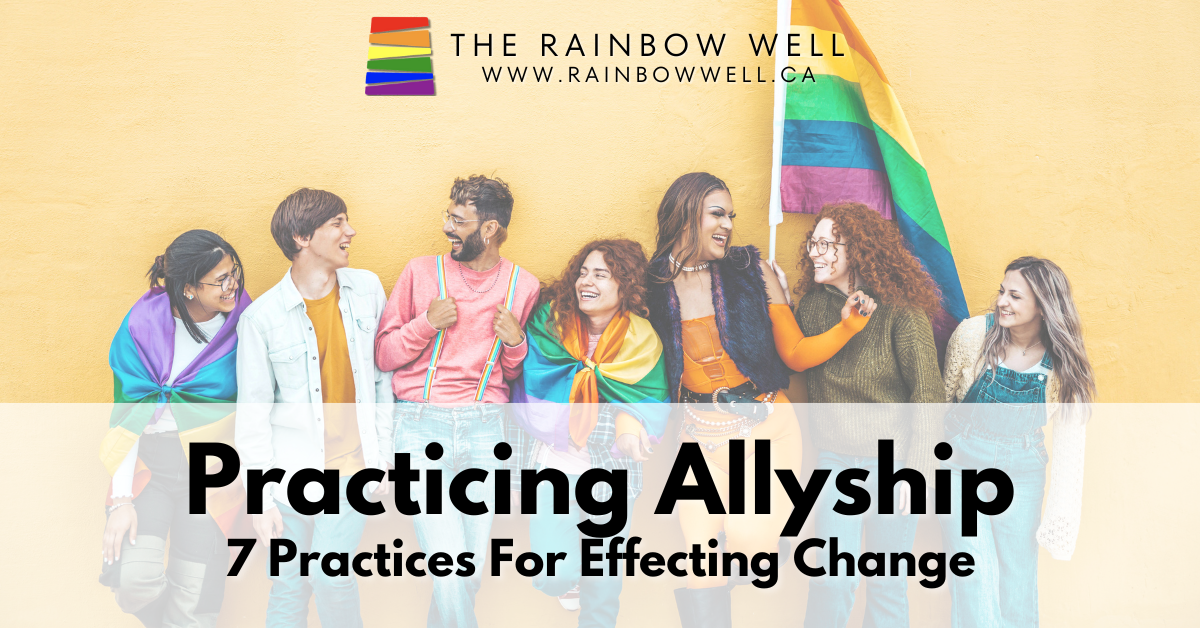Practing Allyship

Over last few years, one of the most commonly asked question I get is this: What does it mean for Christians to practice allyship with 2SLGBTQIA+ people? Many people are dedicated to the cause of equality, dignity, and inclusion with the Church and the world, yet don’t know how to put it into practice.
To that end, I have come up with 7 practices that are critical for effecting the kind of transformation needs in this context. While this is just a brief overview, I believe that each practice builds off the former to help us become better Christians who practice just solidarity with the marginalized.
1. Be Curious
Being curious- being committed to ask questions about everything, even our most beloved beliefs- is a discipline that will help us see the world through different eyes. Nurturing empathy, it is a practice of active listening while withholding judgment. It is also an act of humility, acknowledging that we always have much to learn, especially when it comes to those different than ourselves.
Being curious and the myriad of ways curiosity can find expression remains a foundational commitment on our journey towards active allyship. Not only does it bear meaningful fruit but it reflects the way we are wired and how we flourish. We become curious about that which we care about, and so too can we nurture that same care by embracing the discipline of being curious.
2. De-centering
This practice of de-centering is about shifting the focus away from ourselves and those with relative privilege in any given context, and re-centering on the marginalized. In order to do this, of course, we must learn to admit, recognize, and name our privilege, which is no easy task. When we do so, however, we are then again to prioritize the experiences, perspectives, and wisdom of the oppressed.
In our age of social media, where we are encouraged to speak loudly and often, a commitment to de-centering might include silence, making space for the voices of others. It will also include giving those voices platform through your spheres of influence. It’s about using one’s position to uplift others and being open to criticism and learning. This is a practice of self-emptying that reflects a core commitment of our Christian faith.
3. Give
While the practice of giving can (and must) include financial giving, it is also a call to giving time, energy, opportunity, platform, preference, etc. It is about using the means and capacity we have on behalf of others, even at times if that it goes against our own self-interest (especially where privilege is concerned).
From a small donation to significant reparations, from volunteering to giving up opportunities for the sake of others, the practicing of giving is a measurable expression of allyship that goes beyond charity, rooted instead in justice, mutuality, and love.
4. Speak Up
Perhaps one of the most painful thing oppressed people experience is the silence of others in the face of their suffering, especially when it comes from friends, family, and fellow Christians. The practice of speaking up and speaking out (built on the previous practices above) is critical in the work towards justice and reconciliation.
This principle encourages speaking out against injustice in all areas of life, whether at work, home, school, or public spaces. It involves acknowledging personal biases, confessing complicity, and advocating for systemic change. And when we speak up, we must then act accordingly.
5. Dismantle
The practice of dismantle is about taking apart those systems we’ve discovered in ourselves and the world around us that contribute to hate, harm, and injustice. From bias to fear to disgust, we have to learn to seek out the weeds and pull them out by their roots. We cannot simple give voice to the problems without working also to change things at their core.
Dismantling requires actively identifying and breaking down harmful biases, prejudices, and systemic injustices. It involves introspection and the unlearning of ingrained beliefs that perpetuate discrimination. This is why our faith seeks more than just individual change, but desire God’s kingdom to come “on earth as it is in heaven”.
6. Resist
From non-violent resistance to civil disobedience, the practice of resistance requires us to recognize that “the powers that be” are expending energy and resources to undermine a justice world, requiring of us a greater commitment to actively push back against such efforts.
Requiring more than verbal commitments or performative actions, this practice calls for sacrificial engagement, resisting “the enemy” while refusing to dehumanize those who oppose us. It is one of the most difficult practices because it requires difficult truths to be spoken and direct confrontation to be had. Yet it is also one of the most critical.
7. Persist
As we learn to embrace each of these practices, the final one become all the more important: we must persist. The work of doing justice is difficult and demanding, and while we must care for ourselves and each others, we must not let up on our commitment to change.
Persistence is about maintaining a long-term commitment to allyship and justice, even when faced with setbacks or slow progress. It involves staying engaged, continuously learning, and remaining dedicated to the cause. Persistence acknowledges that true change takes time and sustained effort. So stay the course.
How can you begin to incorporate these practices? What other practices have you learned? Find some friends and start a conversation on starting this journey together.
. . .
by Jamie Arpin-Ricci (he/him), founder of The Rainbow Well

